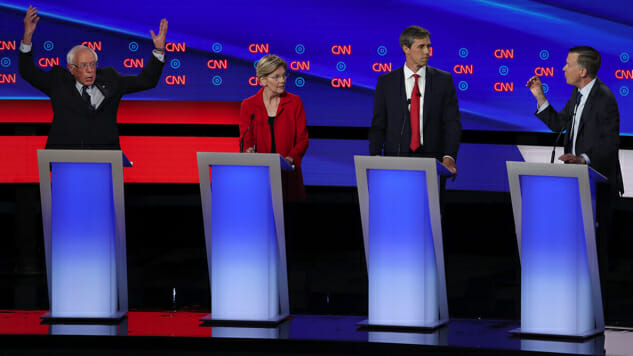How the Five Candidates Who Can Actually Win Performed in the Debates
Photo by Justin Sullivan/Getty
I did Model UN in high school, and I took a loss that still irks me to this day. For most schools, it was a club, but for us it was a senior year elective class that we were graded on, so I felt this loss in more ways than one. We were to study our assigned nation’s positions on the topic ahead of the conference, and how we executed our country’s agenda determined our grade…with bonuses for winning awards at the conference.
My partner and I were France, and the topic was blood diamonds, which the French were (are?) deliberately ambivalent about given the massive profits their industries reap from the trade. The conference was full of bleeding-heart liberal high school students, and we faced a nonstop torrent of anger throughout the entire day, as we did nothing but muck up everyone’s resolutions through meticulously planned time-wasting thanks to our veto power on the Security Council. It was a masterclass in diplomatic back-stabbing. Ultimately, we caved at the end of the day so we could pass something, and abstained from a landmark humanitarian rights bill, and the kid who wrote it, and whipped everyone into voting for it, won the top award for that day’s conference.
That kid’s country, the globe’s new champion of civil rights?
China.
The representative from the Chinese government whipped the entire United Nations into line for a pro-humanitarian rights vote, and a bunch of politically-informed adults rewarded him for his efforts. I don’t care how petty and dumb it is, I will never stop being angry about this. I want my bonus, dammit.
I bring this up because it is a good example of the substantive value of performative political theater. These presidential debates feature people vying for an office that can shift the fate of history without even realizing it, and we’re giving them 90 seconds to explain how they will fix vastly complex issues like climate change. They have more over-produced one-liners than Avengers: Endgame, and it’s not remotely about the substance of the candidates’ speech—because there is simply not enough time to meaningfully unpack any amount of detail in a forum like this. Besides, the debate circuit as we know it isn’t even about substance, it’s about sounding confident and speaking fast.
Know who is known, even on the left, for being a great debater?
Ben Shapiro—America’s preeminent brain pill salesman who spends his days giving legitimacy to right-wing loony tunes fantasies—a man who clearly hasn’t had an original thought since he was six years old. As Shapiro’s success proves, the way to score points and look good in a debate is not to meticulously harp on important details that support your overall argument, but to use speed and conviction to evoke an emotional response from the viewer. Hence the phrase that many use in response to political speeches: “that was powerful.”
Modern debates are more theater than politics. There is a reason the Lincoln-Douglas debates are hailed as a halcyon of political speech, because they were so long they lasted for their own epoch. Across seven exchanges in 1858 for Illinois’ Senate seat, Abraham Lincoln and Stephen A. Douglas spent 21 hours debating the extension of slavery into the new territories. The format allowed for each to submit robust evidence supporting their case—providing one with an hour for an intro, then the other with an hour and a half for a rebuttal, before closing with a half hour rebuttal to the rebuttal—and if it were held on TV today, any generic reality show on TLC would likely do better ratings.
Politics is policy and policy is kind of boring because the devil is usually in the details, and learning about what matters and why at a granular level is difficult and time-consuming. People are busy. As far as TV is concerned, “boring” is the worst thing you could call a show, so these cable TV debates shift politics in the entertainment direction, robbing the exercise of its entire tangible premise and rendering it a test rooted in superfluousness.
But that doesn’t mean these optics are unimportant, nor does it mean these brief moments cannot enlighten us as to how these people would make political choices. If you cannot handle Jake Tapper’s endless stream of easily dismantled bad-faith right-wing questioning, then you cannot handle the presidency. Period. Only three on the first night proved that they grasp the challenges faced by 2019 America, and Kamala Harris and Joe Biden seemed to tread water on the second night while all the folks auditioning for cabinet positions had their moment in the sun.
There are five candidates whose RCP polling average eclipse 3% (an average margin of error in most polls), and unless something unprecedented happens, one of these next five people will be the next Democratic nominee for president, and many who you saw on stage this past week will not meet the threshold for the next debate in September. Here is a quick assessment of where the contenders stand after this round of political theater that was designed for conflict more than clarification.
Pete Buttigieg
He is the Great White Centrist Hope, for good reason. He’s good at this. Rhetorically, he sounds like Bernie and Warren on structural issues—echoing millennials like myself who are sick and tired of hearing the same incremental arguments made by the same politicians over and over—or when we are told to trust Republicans to not be Republicans. If there is anyone near the center who can meaningfully steal votes from the stalwarts of the left (a dubious assertion), this guy is it. The problem with Mayor Pete is when we get into politics, and that’s before we even address ideology or tangible policy failure. His problem is just basic politics.
The guy has never won more than about 10,000 votes in any election. Other than the avalanche of establishment money and consultants flocking to him, there is absolutely no evidence that he can win a state-wide campaign, let alone a nationwide one. He’s a serious political talent, and sticking him next to the flotsam that is the cream of the crop of the last decade of centrism was a stark juxtaposition, but the true test of his political talents will come when we narrow it down to the five who really know how to do this.
Elizabeth Warren
Jim Ross’s famous “BAH GAWD ALMIGHTY, THEY’VE KILLED HIM!!!” call popped into my head immediately after Warren rhetorically disemboweled the guy best known for squeaking by NRATV meathead Dan Bongino in freaking Maryland in 2014.
Elizabeth’s moment pic.twitter.com/Wkj63iaOAB
— Josh Marshall (@joshtpm) July 31, 2019
This was a great moment too.
LMAO @eWarren‘s face when @donlemon Lemon points out her Wealth Tax would hit John Delaney.
She literally RUBS HER HANDS TOGETHER#DemDebatepic.twitter.com/KvyPpTb4oq
— HUMORLESS QUEERS (@HumorlessQueers) July 31, 2019
There’s really not much else I can say about her performance that those videos don’t already convey. She was great. She is charismatic, and policy-wise, she is who she is and she’s been this way long enough to trust her word. She’s the one in this race who could most benefit by tacking to the center, but instead, she spent the entire night playing whack a mole with bad faith centrist arguments alongside many of her supporters’ least favorite “Democrat.” She is a serious threat to Bernie’s leftist momentum, and by successfully branding herself as the Person Who Has A Plan For That (successfully branding herself in large part because she actually does have robust, detailed plans for that), Warren has attracted many conservative Democrats who tend to align themselves with the candidate they perceive to be the smartest in the room. If she can continue to eat into the center while maintaining her hold on the right half of the left flank of the party, on paper, that’s your favorite for the nomination.
Bernie Sanders
Bernie came away from these debates with the biggest tangible asset. Despite having a long career of being a Senate pragmatist and institutionalist, as evidenced not only by much of his work with John McCain, but his current insistence on keeping the filibuster in place, Bernie has unjustly gained a reputation for doing nothing in the Senate. After Tim “Googly Eyes” Ryan tried to lecture him on his own bill, Bernie dunked an exclamation point on Ryan’s head that is sure to make it on to t-shirts and bumper stickers across the country before this column publishes.
Tim Ryan: you don’t know
Bernie Sanders: I do know, I wrote the damn bill! #MedicareForAll#DemDebatepic.twitter.com/Ip6OjmovMn
— People for Bernie (@People4Bernie) July 31, 2019
Bernie needs a jolt to jump back into the top tier of this race. While the “Bernie is in trouble” narrative is a forced one that is not supported by polling, he does seem to be treading water, which looks bad in the wake of Elizabeth Warren’s rise to serious contention. He is loath to criticize Warren for both personal and political reasons, and with her boxing out his right flank, Bernie’s path to the nomination looks a lot more difficult than it did just a few months ago.
That said, Bernie has in effect, already won this primary, as the policy debate is largely taking place on his turf, and that is the kind of message that may not really set in until we get closer to actual voting, when policy becomes more of a focus for voters. Given his organizing operation and fundraising apparatus alone, one would be a fool to write Bernie off this early.
Kamala Harris
Woof. That was a rough second debate for everyone not named Cory Booker, Julian Castro, Jay Inslee and maybe Andrew Yang. The California Senator’s delivery was a little off, and a lot of her more poignant attacks ultimately disintegrated into muddled arguments that everyone both on and off stage seemed to get bored with before the time was up. Kamala Harris wasn’t the worst in this debate, but she certainly wasn’t the best. Many people thought that Warren’s rise was going to happen to Harris (raises hand), but Kamala has consistently polled around ten percent throughout the race and not much higher. That’s Vice President territory. She’s right to go hard after Biden since there are absolutely no votes to her left so long as Warren coasts along Bernie’s right flank, but for these performative moments to translate into tangible results, she needs to draw blood on Biden, like she did in the first debate. While the substance of her attacks on him last night were poignant and righteous, her delivery in this rushed format seemed rushed, and these moments did not have the impact they should have. Joe Biden’s record sucks no matter if you’re looking at it from the left, right or center, and for Kamala Harris to stay alive in this race, she needs to be banging that drum louder than anyone.
Joe Biden
I could talk about how Biden just openly lied about both his Iraq War record and his health care plan that Kamala was right to say leaves 10 million people without coverage, but I’m being told by Jake Tapper that I’m out of time, sorry. Guess a powerful man lying about doing powerful things in pursuit of the most powerful office has to stay a secret. Time to cut to a commercial for Olyxtra, a pill that for $7,000 a month will clear up your skin and could possibly make you bleed to death in the middle of the night.
Biden lies on that stage because no one has time to meaningfully call him out on it, so I’m grading everyone’s performance on the very low bar that CNN’s format set for them. As much as I detest the Halperin-style horse race politics that defines the American political press’s product, the game is the game, and there’s no other one to play, therefore this column exists. We get out what we put in to our politics, and the shallowness of these debates and the politics which spring from them support the assertion that the natural output of that input is President Trump.
Joe Biden’s entire proposition is very simple, and I am beginning to fear that it is immovable through the debates and perhaps the primary in general: he can (supposedly) beat Trump, he stood next to President Obama for eight years, and…um…that’s about it. Joe Biden was not good in this debate. He landed a solid counter-punch to Kirsten Gillibrand when she attacked him for sexist words he wrote, but on the whole, he looked tired and disoriented, similar to Robert Mueller earlier this month. It was very clear which topics Biden prepared for and which he did not, and this performance called into serious question whether Uncle Joe can handle the grind of a presidential campaign.
The problem progressives have is that Biden’s perceived ability to defeat Trump, plus his connection to the president most Americans deem the best of their lifetimes, may very well supersede any truths revealed by the more performative elements of this campaign. His dirty laundry has come out, he has literally praised segregationists, and his polls have risen. What does it take to knock him off?
We already know Joe Biden (or at least we think we do, Senator Biden is a very different animal from Vice President Biden). These debates likely won’t change people’s opinion of him, and the former VP is over halfway to commanding 50% of the Democratic electorate. Where Biden runs into trouble is how many of those on the left find him completely unpalatable (raises hand), and it’s not quite clear how he makes it to 50% of the vote right now. Unless Kamala Harris or Pete Buttigieg make a surge, Bernie and Warren seem destined to cobble up around half the vote (they currently combine for 30.5% per RCP, just 1.7% lower than Biden). If the dynamic when we begin voting in seven months is a relatively equal three-person race between Biden, Bernie and Warren, then progressives may be faced with a very serious dilemma as to who to support, lest we watch Biden waltz through to the nomination with a plurality of voters in a divided field.
Jacob Weindling is a writer for Paste politics. Follow him on Twitter at @Jakeweindling.







































